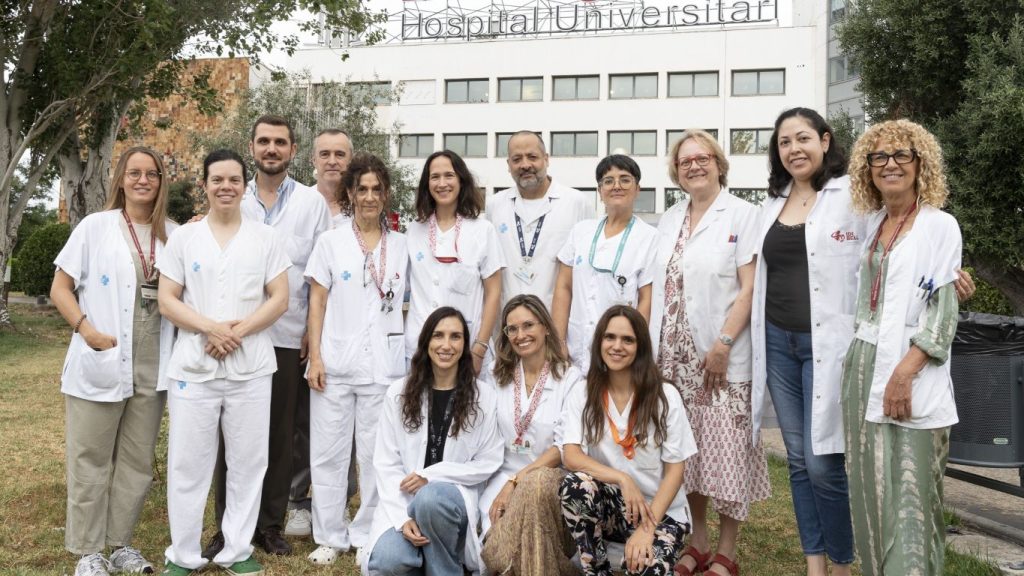One in five severely obese people who undergo bariatric surgery have a preoperative food addiction. Now, a study led by the Bellvitge Hospital and the Bellvitge Biomedical Research Institute (IDIBELL) shows that this condition is not a barrier to achieving significant weight loss, but it can increase the risk of regaining weight after three years, especially in some techniques such as gastric bypass.
The study, published in the scientific journal Nutrients, has analysed 165 people operated on at Bellvitge with different bariatric surgery techniques: vertical gastrectomy, gastric bypass and hypoabsorptive procedures. According to the results, 17.6% of patients had a diagnosis of food addiction before the operation, according to the validated Yale Food Addiction Scale 2.0. The research is the result of close collaboration between the Endocrinology and Nutrition and Clinical Psychology services of the Bellvitge Hospital.
“Food addiction should not be seen as an obstacle to operating. In fact, more than half of these people were no longer obese and had improved the associated comorbidities three years later,” explains Dr. Núria Vilarrasa, endocrinologist and principal investigator of the study and of the Diabetes, nutrition and endocrine diseases group at IDIBELL.
Despite the good initial results, the study also detects a higher weight gain among people with previous addiction: 8.3% from the point of maximum loss, compared to 1.7% in patients without food addiction.
“This risk forces us to strengthen long-term multidisciplinary follow-up to help these patients maintain the results,” says Dr. Fernando Guerrero-Pérez, first author of the study and clinical researcher at IDIBELL.
What is food addiction?
Although food addiction is not officially recognized as a diagnostic entity, its presence is becoming more and more evident. It is common in the general population, even more so among people with obesity, and can also appear in various mental health disorders. However, more and more studies suggest that it can have a real clinical impact.
“It is characterised by a loss of control in the face of highly processed and hyperpalatable foods (with a lot of sugar, fat or salt), and shares traits with behavioural addictions“, explains Dr. Fernando Fernández-Aranda, director of the Eating Disorders (ED) Unit of the Psychology Service of the Bellvitge Hospital, co-leader of the research group at Psychoneurobiology of eating disorders and addictive behaviors of IDIBELL and professor at the UB.
According to the study, having a food addiction does not worsen diabetes remission or reduce initial weight loss. Nor should it condition the choice of surgical technique.
The research concludes that it is essential to treat obesity with a comprehensive and personalized approach, considering metabolic, psychological and behavioral factors. This approach can help prevent relapse and improve long-term outcomes.
The Bellvitge Biomedical Research Institute (IDIBELL) is a research centre created in 2004 and specialising in cancer, neuroscience, translational medicine and regenerative medicine. It has a team of more than 1,500 professionals who, from 73 research groups, publish more than 1,400 scientific articles a year. L’IDIBELL is participated by the Bellvitge University Hospital and the Viladecans Hospital of the Catalan Health Institute, the Catalan Institute of Oncology, the University of Barcelona and the City Council of L’Hospitalet de Llobregat.
IDIBELL is a member of the Campus d’Excelencia Internacional of the University of Barcelona HUBc and is part of the CERCA institution of the Generalitat de Catalunya. In 2009 it became one of the first five Spanish research centres accredited as a health research institute by the Carlos III Health Institute. In addition, it is part of the HR Excellence in Research program of the European Union and is a member of EATRIS and REGIC. Since 2018, IDIBELL has been an Accredited Centre of the AECC Scientific Foundation (FCAECC).

